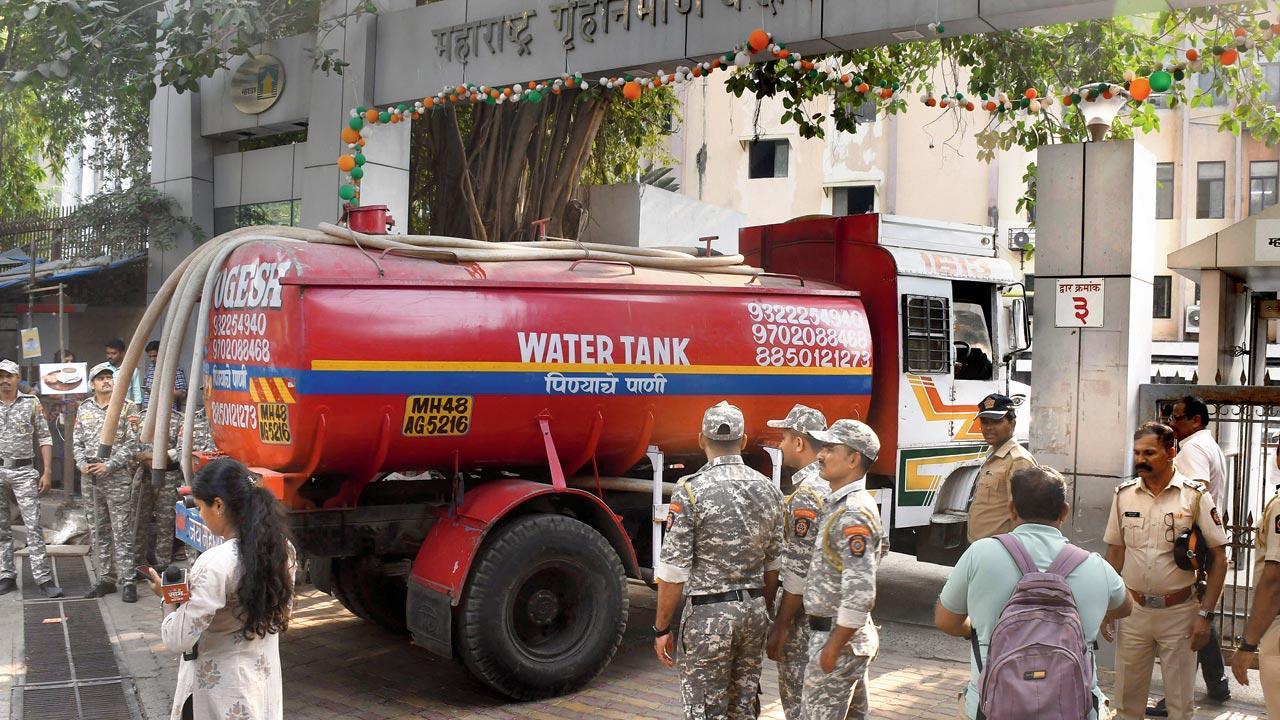Cities at Mumbai’s edge clueless about rules that led to crisis

Even as Mumbai has been forced to implement strict guidelines of the Central Ground Water Authority (CGWA), which regulates and controls groundwater extraction, the Mira Bhayandar Municipal Corporation (MBMC) and Vasai Virar City Municipal Corporation (VVCMC) appear to be clueless about them.
“The office of the CGWA is in Thane and everything will be handled from there. I have received no order from my superiors to implement the CWGA guidelines,” Suresh Wakode, additional chief engineer, MBMC said.
Asked about water supply through tankers Wakode said, “The tanker culture has almost stopped in Mira Bhayandar. We provide 190 MLD water. Only one per cent water is supplied through tankers.” Wakode added that there are around 50 wells in MBMC’s jurisdiction, and they have sufficient water.
VVMC Engineer Rajendra Lad said, “We don’t have a water crisis. We did not get any guidelines from the CGWA, we have no information about it either. We are supplying 230 MLD water to around 24 lakh citizens in Vasai-Virar. Around 15 per cent can be accounted for leakage, which would mean a supply of total of 195 MLD water. Apart from this, five to six water tankers are catering to Adivasi padas. Many housing societies have private water tankers supplying water. They extract water through private wells and other bore wells.”
Also Read: Water crisis: War of words breaks out between govt and tanker body
‘Blame the builder’
Assistant municipal commissioner of P South ward, Rajesh Akre said, “The water crisis started at Royal Palms in Goregaon East. Only the builder of Royal Palms is responsible as he did not construct an underground water tank inside the society, which is mandatory to get water supply. Builders arranged water from private tankers for the past many years, but now suddenly that has stopped. We are ready to supply them with water, but I have only one tanker in the ward. It’s impossible for me to supply water to 20,000 residents with one tanker. I personally gave the society a form to apply for the construction of the underground water tank. However, not a single resident has approached the BMC.”
Akre added, “If society members can arrange tankers, I can provide water from the Goregaon water tank point, which is located near Royal Palms.”
Additional Municipal Commissioner P Velrasu said, “On Monday, a high-level meeting was also held between the Brihanmumbai Municipal Corporation (BMC) and the District Collector. Guardian ministers and political leaders have also held meetings regarding the issue. We are trying to resolve the issue in two to three days. The BMC infrastructure supplies water through pipelines. Many societies do not construct auxiliary suction tanks, which are mandatory to get water through BMC pipelines. Currently, we have only 60-70 tankers across the city with each ward having one or two. It is difficult to supply water to so many citizens with only these many tankers. We understand that the seriousness of the issue. We are also arranging more tankers to mitigate the crisis.”
‘Will arrange water’
“Each ward officer has been directed to make a list of societies and hotels to solve the water issue permanently. Societies without water should approach their ward office. We will arrange water for them. We are using an existing system with a new system to resolve the issue. Societies will have to construct auxiliary suction tanks,” Velrasu added.
Velrasu added that some buildings which have installed auxiliary suction tanks have been given water supply. The water is delivered through a pump considering hilly and undulating terrains. “For buildings without the tanks, a remark is made in the NOC. However, builders do not build them as they are not interested.
Ultimately, the building becomes dependent on water tankers,” Velrasu added. He explained that the crisis in Royal Palms is owing to the lack of one such tank.
70
Approx. no. of water tankers with BMC
Businesses at risk
Secretary of MWTA (Mumbai Water Tankers Association) Rajesh Thakur said that the businesses of around 350 tanker owners are at risk as all vehicles are lying on the roads. “Consequently, families of around 15,000 people engaged as drivers and cleaners are directly affected. How will they run their houses and provide education and food to their families? The government must think about them,” Thakur said. According to Thakur, the following number of tankers are provided to various entities in Mumbai:
Hotel: 300 tankers*
Coastal Road Project: 200 Tankers
Nhava Sheva: 100 tankers
Mumbai Metro Project: 200 Tankers
Hospitals: 40-50 tankers
Beautification work (on divider):
100 Tankers
Indian Railway: 200 tankers
(at Bandra Terminus, Kurla, Mumbai Central and CSMT)
(*Each tanker contains 10,000 litres water)

Atul Tiwari is a seasoned journalist at Mumbai Times, specializing in city news, culture, and human-interest stories. With a knack for uncovering compelling narratives, Atul brings Mumbai’s vibrant spirit to life through his writing.





